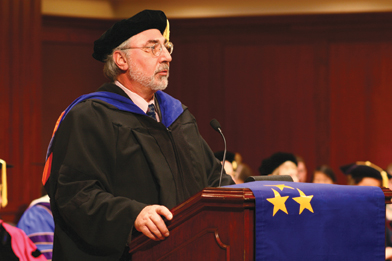In Focus
Anderson garners national honors for student advocacy
Associate Provost Robert Anderson has been honored as an Outstanding First-Year Student Advocate by the National Resource Center for First-Year Experience and Students in Transition.
“For the campus community, Professor Anderson is the face of the First-Year Experience,” said Beth Paul, interim provost and vice president for academic affairs at TCNJ. “Faculty members acknowledge his expertise with the regular refrain of ‘Ask Bob,’ and although student advising is not part of his official responsibilities, the students so frequently seen in his office attest to the fact that the student grapevine has pegged him as someone knowledgeable, responsive, and caring. ”

Robert Anderson
Anderson has led TCNJ’s comprehensive First-Year Experience Program at the conceptual and practical levels. It includes a first-year seminar linked to mentoring and the residential experience, community-engaged learning, and a body of courses developing students ’ skills and introducing them to discipline-based ways of knowing. Based upon the success of the program, Anderson has been asked to serve as a consultant for the Association of American Colleges and Universities, as well as for numerous individual colleges and universities.
He is currently leading an effort to recognize and share successes in student mentoring and advising across academic units in order to highlight the importance of advising on campus and enhance its effectiveness at TCNJ.
Joseph Garavente ’08
Faculty emeritus provides special endowment gift to TCNJ
For nearly 40 years, William “Bill” DeMeritt was considered one of the most visible faculty members on The College of New Jersey campus. So immersed was he in the everyday fabric of TCNJ that his very presence often seemed an extension of the classroom.
In retirement, not much has changed. Earlier this year, the emeritus professor of English made the first installment of what will eventually be a six-figure commitment in support of a provost ’s discretionary fund that, in perpetuity, will support undergraduate research. His initial donation came in the form of a charitable gift annuity that will also provide both he and wife Barbara additional annual income, as well as tax-savings incentives.
“It was not unusual to find a student (or a few) hanging out in his office and chatting, ” according to Lee Harrod, a colleague of DeMeritt’s in the English department. “His office was in the honors residence hall at one point, so he saw many students every day. I think Bill is one of the people who has helped make this place really special for students. ”
DeMeritt founded TCNJ’s Honors Program, which, under his leadership, was recognized as among the model programs in the region. He not only planned and attended activities with honors students —to the shore, museums, and to lectures—but he also served as mentor to the College’s successful Quiz Bowl team.
“I am grateful to have been able to work with such bright and creative students and such supportive colleagues, ” DeMerrit explained. “I am now fortunate to be in a position to give something back to such a great school. ”
Emily Weiss ’03
Winston takes human rights efforts to Copenhagen
Morton Winston, chair of the Department of Philosophy and Religion and director of the Center for the Study of Social Justice, was recently named the Danish Distinguished Chair in Human Rights and International Relations for 2007 –08. This senior Fulbright Research Scholarship provides Winston with the opportunity to spend four months in residence at the Danish Institute for Human Rights in Copenhagen. There, he will contribute to the institute ’s active academic exchange and aid the institute in networking with American universities and research environments, in addition to participating in conferences and teaching activities.

Morton Winston
Winston’s research interests revolve around contemporary human rights theory. While abroad, he will be working on a research project on corporate social responsibility for human rights. “The past decade has witnessed a remarkable growth in the idea that major corporations have significant social responsibilities for protecting human rights and the environment, ” Winston said.
The goal of his upcoming research is “to create an integrated model for corporate social and environmental responsibility that combines a comprehensive assessment tool with an effective auditing and monitoring system and a standard reporting framework, ” he said. “Such an integrated model would provide greater standardization, transparency, and accountability than we presently have in the rapidly developing field of corporate social responsibility.
“The project will focus on voluntary measures, but with some attention to the legal and regulatory issues that must also be addressed as governments move toward better enforcement of laws regulating corporate behavior. ”
Once his tenure at the institute is complete, Winston hopes to either “produce a book” or edit a special issue of The Journal of Human Rights touting his research.
The honor of Danish Distinguished Chair in Human Rights and International Relations is Winston’s third Fulbright Scholarship. His previous awards took him to South Africa (1992 –93) and Thailand (1999–2000).
Nicole Levins ’07
TCNJ’s Kang working out fat burning myths
The average pizza-loving, cheesesteak-consuming member of the College community might not be aware, but the campus has a bona fide fitness guru in its midst.
In the past few years, professor Jie Kang of the health and exercise science department has become a go-to fitness expert for many major publications, including The Washington Post, Self, Men’s Health, and Muscle & Fitness. Recently, Kang was contacted by Consumer Reports about writing a short piece on workout tips for those in a time crunch.
Though he also teaches classes in applied physiology, Kang’s field of expertise is metabolism. Most of his research focuses on “which produces most energy expenditure,” he said. Kang is currently comparing different methods of exercise to see which “burns more energy, which in turn burns more fat.”
Kang’s emergence in the international spotlight can be traced back to his 2003 study on workout efficiency, published in the European Journal of Applied Physiology. In TCNJ’s own Human Performance Laboratory in Packer Hall, Kang and his colleagues, Professors Nicholas Ratamess, Avery Faigenbaum, and Jay Hoffman, had eight men run for 30 minutes on two separate days.
On the first day, the men ran at a high intensity for the first half of their workout. On the second day, they ran slower at first and finished the workout at a higher intensity. According to Kang ’s results, more energy was expended when the men ran faster first, which adds up to about five to 10 percent more fat burned in a workout.

“We involve a lot of students,” said Kang of his research, but not typically as subjects, because his health and exercise science students tend to be much healthier than the overall population.
So Kang has them assist with data collection and entry, statistics, and general research.
A lot of his research focuses on the athlete’s “perception,” Kang said. To work out harder in the beginning of a run, as opposed to the end, really has no effect on how tired an athlete feels. “The body’s still burning the same amount of energy,” he said, but in the long run, the total fat burned is greater.
In 2005, Kang studied the spinning craze of the late 1990s. Made popular by the praises of celebrities like Julia Roberts, the stationary-bike group workout continues to be a popular fitness trend today. Kang found that the varied intensity that occurs over the duration of a typical spinning class causes the athlete to burn more fat than just steady pedaling alone. The results of this study were published in Medicine & Science in Sports & Exercise, the official journal of
the American College of Sports Medicine.
“For cyclists trying to lose weight, spinning classes can help you lose it faster, ” Kang said.
Due to obvious biological differences, Kang’s studies are split by sex. Interestingly, Kang has found thus far, despite common belief otherwise, that women experience greater weight loss and fat burning than men.
“Women are more likely to be successful…over time,” he said. “Women have the edge.” An article detailing these findings is currently under review.
Nicole Levins ’07


